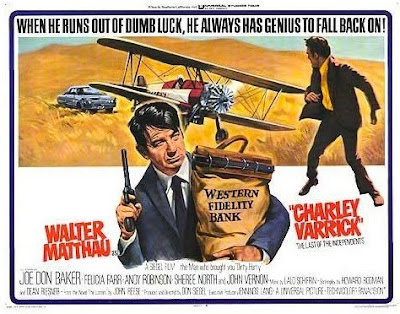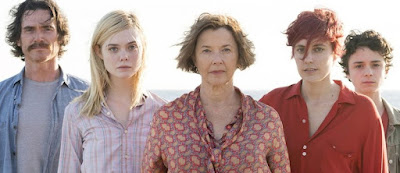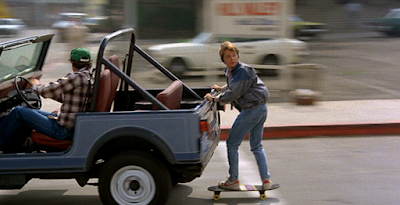The end of the problem is obvious in Jaws (the shark gets blown up), but some problems aren’t solved so definitively. If the hero doesn’t know when his problem is going to end, the writer must establish a “dramatic question” in the minds of the audience, creating a subconscious expectation in our minds of when the story will end.
In the wonderful heist movie Charley Varrick, Walter Matthau robs a small-town bank only to discover that he’s accidentally ended up with the mob’s money, and now he’s being hunted by some very bad guys. The reality is, even if he gets away, he’s going to be on the run for the rest of his life, so how could the filmmakers keep the ending from seeming anticlimactic? They came up with a great solution: Near the beginning, we see one of the mobsters announce, “He’ll never make it out of Arizona alive!”
This is brilliant, because the audience subconsciously notes that “getting out of Arizona alive” has now become the official measure of success, so we’ll stand up and cheer when Charley cleverly gets out of the state, even though we know he’ll have to keep running for years after that.
Likewise, near the beginning of Never Cry Wolf, we see a bunch of grizzled Yukon mountain men laugh at nerdy newcomer Charles Martin Smith, who has come to study wolves. One of them declares, “He’ll never make it through the winter!” Once again, we instantly accept that as the benchmark of success, even though his story will continue past the end of the movie.
Of course, in both of these cases, it still would have been fairly obvious that the movie was over, since each movie ends with the hero leaving town. In these cases, the question is intended to make a potentially anticlimactic ending seem more satisfying. But some stories truly need the dramatic question to be stated openly.
The Godfather is a long, sprawling story. Our hero Michael leaves town in the middle, hangs around in Sicily for a long time, and then comes back for the final stretch. The primary relationship, between Michael and his dad, ends halfway through when his dad dies. The secondary relationship, between Michael and his fiance, Kay, seems to end a little later when Michael weds someone else in Sicily. So why does the story keep going? Why doesn’t the audience get (overly) frustrated?
Here, too, the end date is planted in our mind subtly at the beginning of the story, when Michael tells Kay, “In five years, the Corleone family will be completely legitimate.” So the dramatic question becomes, “Is that true?” No matter how many ups and down and beginnings and endings Michael experiences over those long five years, the ultimate question remains unanswered, so the audience is willing to go along for the ride toward that five-year deadline without saying, “Jeez, I thought this movie was done an hour ago!”
Rulebook Casefile: Dramatic Questions on CSI How many storylines should a pilot have? Usually, they have fewer storylines than an average episode. Because we have to get to know all of the characters and the world of the show, there’s less time for plot. But another way that the “CSI” pilot is remarkable is that the creators go the other direction: there are five cases in this episode.
This is another way in which the show was unusually realistic and still very unrealistic at the same time:
- On the one hand, we’re seeing them contribute to some cases and then hand the work off to others, and accepting that we may never hear about this case again. This allows them to spotlight the quotidian reality of police work, and just show “a night in the life of a forensic lab”, instead of pretending that police only pursue one case at a time, as one might guess from “Law and Order”
- But they know that we’ll demand closure to at least some of the cases, meaning that they have to create two cases that unrealistically get reported and closed all within that one night’s span, including instantaneous test results that actually would have taken weeks.
And here’s the remarkable thing: the audience barely notices. Looking back, there is a moment where Grissom tells the victim, “We’ll keep trying, something will turn up eventually, it always does,” but you hear that on cop shows all the time, and I for one never noticed that the case is never mentioned again in this episode. (It would indeed be solved eventually when new evidence appeared twenty episodes later.)
Normally, it’s very unsatisfying in any story if the original dramatic question is simply abandoned, but this is another remarkable achievement of this show: they get us to admire the team’s successes and failures, and they discourage us from differentiating between the two. This is part of the show’s celebration of the scientific method: the purity of the process is more valuable than the attainment of a desired result. The fact that, by the end of the pilot, we’ve already learned to admire Grissom despite his lack of results is a testament to how successful they have been in quickly rewriting our expectations.
Rulebook Casefile: Asking the Right Dramatic Question in Groundhog Day (And Shutting Down the Wrong Questions) Rewatching Groundhog Day, I realized a curious thing: I’ve always admired the ending for not explaining anything, and just leaving it as a metaphor…but why do I like that here when I hated it so much on “Lost”?
In the infuriating “Lost” finale, it felt like they were saying, “Whatever, dude, let’s just say it was god or something…It’s all just an allegory anyway, so what do you care?” Groundhog Day could be characterized the same way, but it’s a master class in how to do it right. It didn’t have to answer those questions because it never asked them. There’s only one question this movie wants to ask:
- What should Phil do with his day in this town?
- Why is this happening?
- What was the one mistake that Phil made that caused him to be punished in this way?
- How did Phil become such a miserable person?
- Will Phil make amends for his lifetime of wrongs?
- Can Phil reconnect with his parents, lost loves, etc?
A big part of the answer is the blizzard. What does the blizzard do for the movie? On first viewing, we only notice two things:
- It proves he’s not a very good weatherman, since he failed to predict it.
- It makes him even more miserable, by trapping him in a town he hates and downing the long-distance wires, so he can’t call and complain to anyone.
- He can’t go anywhere.
- He only has access to one therapist, who sucks, so he only visits once.
- He can’t visit any paranormal experts.
- He can’t reach out to anyone from his present.
- He can’t confront his past.
The 40 Year Old Virgin | YES. Very much so: When will he finally have sex. |
Alien | YES, when will they kill the alien? |
An Education | YES. Will she get into Oxford? |
The Babadook | YES. Can they make it until the psychiatrist comes? |
Blazing Saddles | YES. Same as above. |
Blue Velvet | YES. whose ear is that? |
The Bourne Identity | YES. what will happen when Bourne and Conklin meet? Why did Bourne lose his memory? |
Bridesmaids | YES. Will the wedding go well? |
Casablanca | YES. we also see a plane leaving and people wondering who’s on it. |
Chinatown | NO. This movie has major dramatic question problems, as we’ll discuss. |
Donnie Brasco | YES. his wife asks him how much longer. |
Do the Right Thing | YES. It’s clear that this will be the story of one day, and it is asked what will be the consequences of the heat. |
The Farewell | YES. Well, we’re primed for the lie to come out, and, whether or not it does, for her to die, but neither comes. But the movie is structured around the trip and does end when the trip ends. |
The Fighter | YES. He says he’s going to be a champion. |
Frozen | YES. The dramatic question changes a few times, until Anna gets hit in the heart and the dramatic question for the rest of the movie is, “Will she beat the curse?” |
The Fugitive | YES. It’s implied: when will Gerard take Kimble into custody. |
Get Out | YES. Chris’s dramatic question (Will they accept me?) will be answered definitively (and ironically) halfway through, and then we will default to Rod’s original question (Will he make it home?) |
Groundhog Day | YES. The first shot after that: His hand against a green screen: “Somebody asked me today, ‘Phil, if you could be anywhere in the world, where would you want to be?’” |
How to Train Your Dragon | YES. Where is the nest? |
In a Lonely Place | YES. did Dix kill her? |
Iron Man | Not really. The movie kind of ends halfway through, then fires back up again. Finally, it becomes, “Can Stane be stopped?” |
Lady Bird | YES. Well, we assume based on everything that it’ll end when she leaves town, but it goes a little longer, which tries our expectations a bit, but we accept it. |
Raising Arizona | YES. At what point will Nathan Arizona confront his kid’s kidnappers. |
Rushmore | YES. We think the question will be, “Can Max stay in Rushmore?”, but he’s kicked out early on, so instead it becomes, “Will Max find love?” |
Selma | YES. We see the woman denied the right to register and so we build to the moment when she’ll get the right to register. We see the marchers turn back twice and look forward to them making it. |
The Shining | YES. The question is raised early on of can they make it through the winter without going insane, so we know that the movie will end when they leave, one way or another. |
Sideways | YES. The wedding is coming up, they talk about when he’ll drink the 1961 wine, and Jack pledges to hook Miles up. |
The Silence of the Lambs | YES. Can they catch Bill in three days before he kills again? |
Star Wars | YES. What are the plans, why does the empire want them, and who will end up them? |
Sunset Boulevard | YES. how does Joe end up in that pool? (Sikov claims that most people don’t realize that’s Joe until the end, but I think most people do.) |












